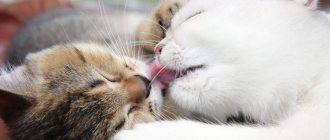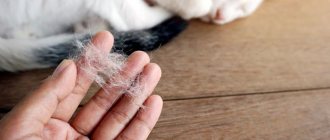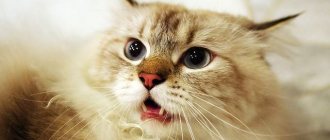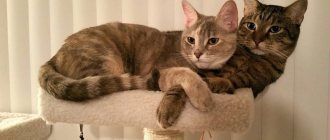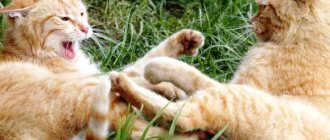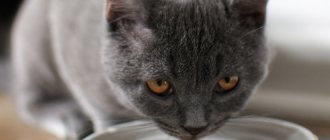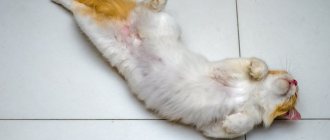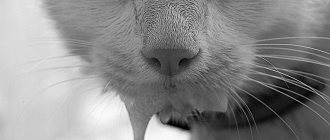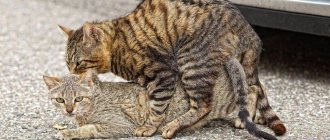2159Administration
9
Does your cat just sit and stare at you when you throw her a ball? You may be concerned about this. Let's look at why your cat may be apathetic to play and what you can do about it.
All kittens play, but their high interest in play peaks around 4 to 5 months of age and then gradually declines.
Once cats reach adulthood, they tend to fall into two groups: those that continue to play and those that prefer to be less active.
© shutterstock
Inactive behavior may be normal, but you also need to rule out health problems that may be affecting your cat's behavior.
Health
Health certainly affects your activity level. Age-related problems such as arthritis can reduce your cat's interest in playing. Any health problem that makes your cat feel unwell, such as intestinal parasites, can reduce its activity.
Symptoms of health problems
Changes in your cat's usual behavior may be a sign of health problems. If your cat usually loves to play but suddenly becomes inactive or lethargic, it may be worth talking to your veterinarian . The test may reveal a urinary tract infection or other problem that can be corrected with treatment.
If your cat is in good health, then you can use some ways to stimulate play, we will look at them below.
Cat game. Why doesn't he want to play? Perhaps it's your fault.
The cat's play is a necessity for him, it is an integral element of his “working” day. But what if the cat doesn't want to play?
Every chance I get, I try to remind you how important fun is to a cat. This is a necessary element of caring for a cat, and not an exception to the rule or a luxury that we give to our pet from time to time. However, not all Murzik are interested in the game, and some simply do not want to play. Are you sure? Do you think your cat doesn't like to play? And you are wrong...
Hunting fun
For a normal day, a pet must do some necessary things that define and realize its original character. What are these tasks? Sleeping, toileting, grooming and of course hunting. The latter consists of several elements: sneak, catch, kill, eat. These activities give the cat a sense of accomplishment and satisfaction, both outdoors and at home. However, not everything is possible under our roof. In exchange for actual hunting, the cat should be given the opportunity to participate in a game that resembles it.
Small cats devote most of their free time to playing. They do not need to be specifically stimulated or encouraged to do this. Adult cats, of course, can also find entertainment, but being confined within four walls is usually accompanied by boredom. Lack of stimulation often translates into depression, frustration and consequently health and behavioral problems. It is up to the guardian to decide whether the cat will be bored at home. Moreover, the cat's guardian is obliged to provide his pet with activity, and if he does not do this, he will be responsible for his illness and for the fact that the pet does not properly discharge accumulated energy.
“But my cat doesn’t want to play”
Okay, but what if the cat doesn't want to cooperate and just doesn't play? Caregivers who complain about “lazy cats” usually think of play as a form of racing. Meanwhile, the cat would like to see it completely different... Every cat plays or would like to play. If he stands still, the fault is probably ours!
It's not the right time to have fun
Very often the owner chooses the wrong moment to play with the cat. We do not adapt to the rhythm of the cat's day, but on the contrary: we try to adjust the cat to ourselves. Therefore, we offer the cat a game when we have free time. Meanwhile, he prefers to sleep, eat or wash. So when should you play with him?
During the day, the cat accumulates energy. It discharges at certain times, for example, after waking up, after eating, after returning home, in the evening after dinner. You should play with your cat when she has increased energy, not when she is replenishing it. If we do not provide this, the cat organizes activities for itself, which we do not always like: walking through closets, hunting people, meowing, nightly escapades. This may manifest itself as nervous tail wagging, fur twitching, or aggressive behavior. If the energy does not find a way out, it will accumulate in the cat and cause it to become upset and unwell. Both physical and mental. Therefore, when we see that the cat is active, let him grab the toy! Let's not wake her up when she's sleeping, let's not force her to play while eating. It does not make sense.
Before bedtime
Playing with your cat before bed can ensure that your cat will sleep with us throughout the night. He won't meow, demand food, or wake us up because he's bored. Try to devote 15 minutes to your pet before bed and the positive effect will come faster than you think!
Missed sentences
Now that you know that fun should resemble hunting, don't be surprised if your cat doesn't want to play with a mouse that's been lying on the floor for a month, a fishing rod that you insistently wave in front of its nose, or toys that make too much noise. (cats have very sensitive hearing). The most important element of hunting (and therefore fun) for cats: stealth, strategizing, and mental challenge.
So put in a little effort, make the toys look like victims, and act accordingly. They should be hiding and running, not compulsively lying on the floor for weeks. When you make a toy imitate the movement of prey, you can expect more interest than if you throw a ball of yarn on the floor and leave the cat alone with it. Of course, there are cats for whom such a game is enough. However, it is worth trying to diversify the process, especially if the cats themselves do not show play activity.
Hunting, not just running
The most important element of the game is not the pursuit. Yes, a cat must also move to keep its body in top shape, but the most important thing in hunting is something else. Observing the potential victim, following him (even with his eyes), concentration, mental involvement, this is what good fun should be based on. If you're expecting your old or sick cat to start producing, you may be disappointed. Watching flies is already interesting for such a cat. It's important to understand how your cat defines fun and how his age and physical condition allow him to do so.
No success
The hunt must be successful. Who wants to run after something they can never catch or eat? That's why I suggest skipping the lasers and letting your cat go into hiding with a toy. After all, this is what cats do in nature. They hunt, drag their prey to safety, consume, rest, bask in the satisfaction of a successful hunt. At home, it is also useful to reward your cat for activity with a treat. Let her know the hunt was a success! Let her know that having fun pays off!
Old age and illness
The lack of desire to play can also be caused by the age or illness of our furry. However, this does not mean that we give up on the fun in the case of elderly and sick cats. On the contrary, it can be a potion of youth, as well as a cure for many diseases. However, the activity must be adapted to the cat's capabilities. Nothing beats the joy that comes from a cat's eyes while playing! I guarantee you will love it too.
Play is a physical and behavioral necessity for cats. The practice of all its elements is a real celebration of the cat's sense of confidence. An active cat is a cat without behavioral problems. An active cat means a healthy cat! If your cat isn't keen on activity, consider why that is. Perhaps there are no conditions for this, there are no corresponding details. Or maybe, over the years of inactivity, he has already forgotten how to do this? You must teach him to play again. However, remember the rules of proper fun and that your participation in it is as important and necessary as the participation of the cat herself.
Do cats manipulate us? The cat meows like a baby to get what it wants!
Do cats manipulate us? The cat meows like a baby to get what it wants! A cat meows for various reasons. But one thing... Tag “Next”
What makes you disgusted with cats?
What makes you disgusted with cats? Apparently cats and people either love or hate each other. It’s hard for us cat lovers to understand why... Tag “Next”
Why do black cats change color? Here are 6 reasons
Why do black cats change color? Here are 6 reasons why is your black cat starting to lose its original color? Have you noticed that his... Tag “Next”
8 Most Emotional Cat Breeds
8 most emotional cat breeds They will win your heart not only with their appearance, but also with their behavior. The cats of these... Tag "Next"
Why doesn't the cat kneel? Can this be changed?
Why doesn't the cat kneel? Can this be changed? Some cats avoid human laps at all costs. Why? Can you... Tag "Next"
Jealous cat. How to fight?
Jealous cat. How to fight? A jealous cat can cause a lot of trouble for a household. To make matters worse, he suffers from it too... Tag "Next"
How to recognize cat pain in advance?
How to recognize cat pain in advance? As it turns out, a cat's facial expressions can give us subtle tips about more than just the well-being... Tag "Next"
Why do cats love heights?
Why do cats love heights? Find out why cats love heights and how to create a cat-friendly jungle at home. You are holding a cat... Tag "Next"
Why does a cat wash itself as soon as you pet it?
Why does a cat wash itself as soon as you pet it? It is worth remembering that licking in cats is not only grooming... Tag “Next”
The connection between a cat and a person. Scientists explain.
The connection between a cat and a person. Scientists explain. A cat can steal the heart of any tough guy. What do cats have that attracts... Tag “Next”
Action plan when the cat becomes lazy
First of all, if your cat is too fat, you will have to adjust his diet with the help of a veterinarian who knows how to balance the diet. As soon as your cat's diet is in order, start taking action.
#1: To get your cat moving, you need to get him to do short, frequent exercises, starting at feeding time. You will have to feed him two or three times (preferably) a day when he is hungry enough and therefore more interested in moving around, following you with a bowl in his hand. Walk around the house for at least 5 minutes, getting him to sniff the bowl, place the bowl under his nose, and then pull it in, encouraging him to follow it. The first few times he may stop and you will have to move closer and get him to sniff the food again.
When he follows you, compliment him and give him a piece, perhaps dropping it a little farther so she can appear as prey to him in a jump. Repeat the movement. If he doesn't move, don't give up BUT don't feed him either. Until he makes at least a few attempts to take action. Continue for a few days until he understands that in order to eat, he will have to "hunt" his prey.
What to do if the cat is lazy
You got a cat and now he's your most loyal companion, watches the same TV shows, supports your own team and, above all, starts to look like you. If you don't want your cat to get sick from obesity, you should teach him to move more.
Don't be fooled, it won't be easy, especially because if your cat has reached a significant weight and is less mobile, it will be much more difficult to convince him to get off the couch. Therefore, you will have to start with the strongest irritants (hunger) and you will have to move with it.
Why does my adult cat refuse to play?
Contents hide
You are frightened by the metamorphoses occurring with your pet. Still fresh in my memory are the times when he was an ordinary little kitten - mischievous, active and incredibly playful. Everything was used: feathers, fishing rods, toy mice, a candy wrapper on a string, and even the owner’s ankles. And now several years have passed, but the pet seems to have been replaced. Now he is phlegmatic, lazy and inactive. Most of the time he sleeps with his paws tucked under him. What's happening? Maybe the cat needs help?
Let's start with the main thing: all kittens (like all children) are very active. The peak of activity occurs at the “golden” age of 4-5 months, when kittens turn into real “energizers” from television advertising. Then the activity of the pets slowly but surely declines. As cats grow older, they are divided into two conditional groups. Representatives of the first “calm down” and “settle down”. Bursts of play activity continue; animals are not at all averse to supporting the initiative to play and indulge. Representatives of the second group do not lose activity, essentially remaining the same kittens, only matured. They run, jump and climb almost tirelessly. They even seem to sleep less than their calmer counterparts.
But the caring owner noticed that the pet was refusing any offer to play. He is not attracted to mice, the light of a laser pointer, or other toys. This pattern of behavior can hardly be called the norm. Even older cats, domesticated, calm and confident, usually respond to requests for fun and play. Let's look at all possible versions.
Age-related sores. Perhaps old age has crept up on your pet, and with it various age-related diseases. For example, arthritis, when every extra movement causes pain. But arthritis is not the only reason cats become less active. So, it would be useful to check the animal for parasites. Helminths, for example, reduce the activity level of pets by an order of magnitude.
"Wrong games." Cats most readily choose games that simulate hunting. Track, pursue, catch and strangle - all these “phases” must be present in the game. Take a critical look at the range of toys you offer your pet. Perhaps the cat simply has nothing to choose from, and instead of “hunting” you are only disturbing, tugging and disturbing the pet.
Stress. Cats love the established order of things and adhere to the once established life schedule. Any sharp or sudden changes in the environment entail stress. A depressed, withdrawn cat refuses to play, and this is quite natural.
Once again, we warn owners: watch your furry friends. If negative changes in your pet’s condition occur abruptly, suddenly, in the midst of everyone’s well-being, contact your veterinarian as soon as possible. First you need to check the health of the animal. In the case where there are no medical problems, it is necessary to change approaches to organizing games.
What to do? It’s quite possible that you haven’t found the “perfect toy” for your pet. Remember our key phrase: the “correct” game for a cat is one that simulates hunting. Do a little preparatory work, buy, for example, a tray of sprouted “cat grass” at a pet store, and see what happens next. Toys filled with catnip have worked well. Make your cat work hard to find the toy and get a good feeling. Also visit a store selling leisure and hobby goods. Offer pheasant feathers - a rare cat can resist them. Arrange it so that the feather “disappears” right before your pet’s eyes. For such an attraction you will need strong threads and an old T-shirt or shirt. Also look for bait toys. Consult with a store sales consultant - he will guide you by types of toys and offer the most suitable options from those available. Experiment, try, move your furry friend!
Quoted in: Why Won't Your Adult Cat Play? Author: Amy Shojai. Source: thesprucepets.com Photo: unsplash.com
